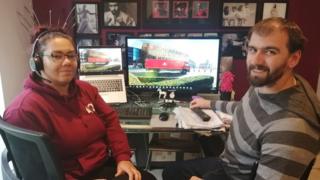Working from home: ‘I’m a bit brainier than he thought I was’
 Image copyright Samar Small
Image copyright Samar Small What is it you do again? Before the coronavirus lockdown a lot of us didn’t really know what our partner did at work. Our eyes have been opened.
«I was just mum,» says Samar Small, looking back to life before lockdown. Her family didn’t give a second thought to what she did day to day.
Samar is a manager at Royal Mail, responsible for a range of things, including communicating with bulk buyers of stamps (like the supermarkets), mail redirection services, and overseeing Santa Mail, planning for which commences in May.
She usually works out of the Cardiff Mail Centre with colleagues hot-desking around her. Since March she has swapped that for the kitchen table in her three-bedroom semi, with her husband and two teenagers milling around, picking up snippets of conversations involving big projects and huge sums of money.
«They hear the figures being bandied round: ‘What about that £2m?’ It’s not what they expected,» she says.
Her husband Stephen goes into work at weekends, in a role at Royal Mail that she used to do herself, so she has a good grasp of what he’s doing. But it’s the first time he’s had much insight into what she does all day.
«I’m probably a bit brainier than he thought I was – dare I say it!» she says.
«It’s been a bit of an eye-opener,» admits Stephen. There are the stacks of spreadsheets, all the financial accounting acronyms, and the hours and hours on the phone to everyone from suppliers to senior managers.
He’s been «blown away», he says, by just how professional she is all round, her confidence in challenging other people’s plans if she sees a flaw, and her eloquence and firmness in meetings.
‘No clue’
«Most of us find that we get to know somebody perfectly well, and can love and live with them, and still not know what they do,» says psychologist and executive coach Sue Firth. «It’s quite revelatory to see what your other half does.»
Discovering more will often reinforce mutual respect, she says, including when parents with jobs find out just how much work it takes to keep the house and children in order.
The learning curve has been steeper for some than others. «Kirsty» from Sheffield estimates her police officer husband knew «pretty much zero» about her job as a financial consultant before lockdown. (She didn’t want us to use her real name because of her husband’s profession.)
«He had no clue. He struggled to tell people what I did,» she says.
More than anything, he’s staggered by the level of responsibility she has, and the sheer volume of work on her plate.
«[Before lockdown] he never understood why I was working so late. He probably thought I was hanging out having a drink,» says Kirsty. Now her husband sees her working 12-hour days.
As for her, she can’t help but get a lot more insight into his work, when every few minutes his police control centre radio is crackling into life.
Having a husband who is in the police means she’s already a bit «hardened» to what she hears, but the call-outs for suspected suicides are still always awful to hear and much more frequent than she expected.
He’s a detective constable, so has to collate files of evidence for the Crown Prosecution Service. That means sitting on a laptop and liaising with colleagues on video calls like the rest of us. There’s a lot of paperwork, but there’s the added pressure of dealing with people and events that are often shocking and unpleasant.
Kirsty admires the way he remains professional no matter what, and feels she’s getting a more realistic idea of what it is like to work on the frontline. «People don’t realise how busy they are,» she says. «The stuff he has to see, to deal with day in, day out.»
‘Who even are you?’
Working from home means we’re not just learning about what our other half does for a living, but how they go about it, and what their «work personalities» are like too.
«I don’t think we ever know our ‘work version’ of our partners. Mine used the phrase ‘sense check’ the other day, I was like ‘who even are you?!’,» says Alison Hinchliffe from Mottram in Greater Manchester.
Her husband Scott works for an American company, and she says she notices a lot of cross-cultural phrases on his Zoom calls.
He’s also seen a different side to her.
«I work in arrears recovery for a social landlord, and obviously have a lot of worried and distressed people on the phone,» says Alison. She says she’s «not a very sentimental person», so when Scott hears her on the phone, «he laughs and says he never realised how much compassion I have».
Spouse ultimatums
Working from home won’t always bring out the best in our partner though, says Sue Firth. If you find yourself living with the «sergeant major» version of your husband or wife it can cause friction.
For example, she says several of the executives she coaches are struggling to cope without the fix of adrenaline they usually get from being in the office environment.
«Some are getting frustrated and are difficult to live with because what matters to them is winning, competition, control,» she says. Some of their spouses have had to issue ultimatums – you work in your study, and when you come out you don’t bring your phone. Other executives she’s spoken to are tense and can’t relax, which isn’t easy for partners and kids either.
Sheri Jacobson, founder of psychotherapy clinic Harley Therapy in London, says such revelations don’t have to undermine a relationship if dealt with well.
«It’s perfectly possible a person is a tyrant at work and a gentle soul at home, and you see both parts when you’re working from home together,» she says. «But with the general rules of communication and empathy it can be worked through.»
Yet even if you only discover very positive traits in your partner, there is the risk of jealousy arising, if you see them getting on a little too well with a colleague for example.
«Your partner will be pretty attuned to notice if there’s any romantic spark or flirtation going,» Sheri warns.
But on a work level too, she says seeing your partner in super-efficient, super-connected mode can feel «a bit threatening to some people».
«It’s possible to feel outdone by your partner because they have better abilities than you were aware of.»
Opposites attract?
Fortunately, that couldn’t be further from the case for Mattia Zambaldi and Frankie de Tavora, who have been working alongside each other in their London flat.
They’ve found plenty of things they don’t have in common. He works for stadium management at Arsenal FC, she doesn’t like football. He gets up punctually at 6:30am, she rolls up, interrupting his meetings, at 9:30. She’s «goofy by nature» and, working in hospitality, is used to an unstructured week. He wears a body brace to ensure a healthy posture and insists on set meal times.
But they’re both gushing with admiration for the other’s abilities.
«She’s very sharp,» says Mattia. «She understands straight away topics that are not straight forward. When it comes down to being professional, sometimes I wonder why she’s not at the top of a big company.»
«I’m super-impressed,» says Frankie. «His dedication is clear to me.»
She says Mattia is able to be both professional and genuinely himself at the same time, and has a vast array of skills. She feels lucky that her future children will have a father with such knowledge.
And if the hours working side-by-side have taught them one thing, it’s that they want to spend more time together, not less. So instead of going back to work, Frankie is considering returning to university. That way she can have weekends and evenings free.
But for some, there are downsides to spending so much time with your partner in a work environment.
«I’ve discovered a severe dislike of his music,» says Alison Hinchliffe. «Phil Collins is awful. I knew I didn’t like him before but I can’t stand him now!»


